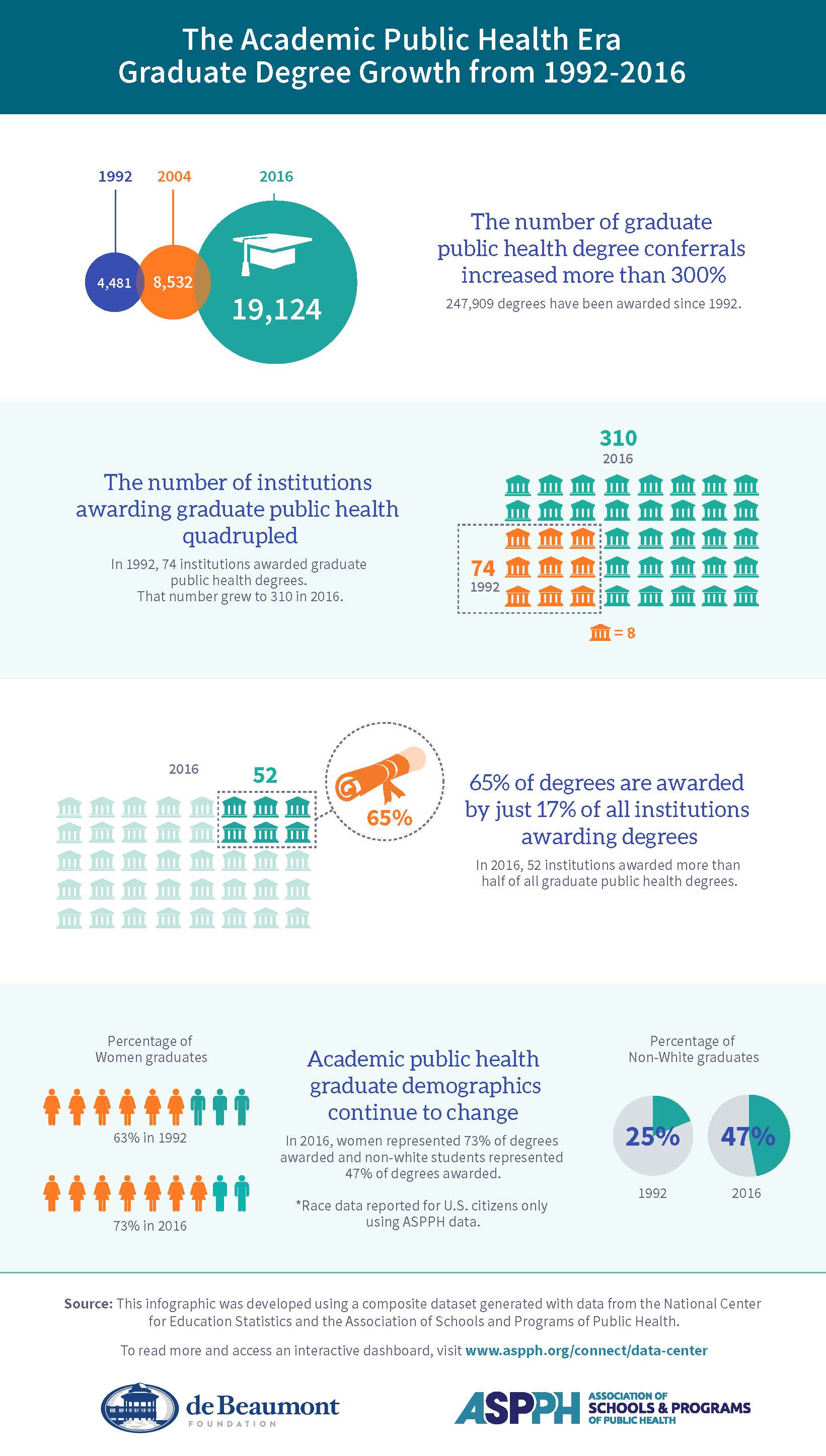SPHIS Home » News » The Academic Public Health Era: Decades of Growth and Change in Graduate Public Health Degrees
The Academic Public Health Era: Decades of Growth and Change in Graduate Public Health Degrees
New research highlights increase in graduates and institutions
The number of public health graduate degree conferrals increased more than 300% from 1992-2016 according to a new study, “Trends in the Conferral of Graduate Public Health Degrees: A Triangulated Approach.” The study presents the first estimates of total U.S. public health degree conferrals at the master’s and doctoral levels.
"Graduate public health education has been one of the fastest growing degree groups in modern history. However, we are beginning to see the signs of a slowdown in total graduates,” said Dr. JP Leider, an independent consultant. “Given what has happened in law and other select fields, we in public health must be vigilant, and make sure the product we offer -- graduate education -- continues to be highly sought after.”
“This growth in students studying public health -- both at the undergraduate and graduate levels -- confirms that students are eager to enter this dynamic and diverse field,” said Dr. Laura Magaña, president and CEO of the Association of Schools and Programs of Public Health (ASPPH). “It is an exciting time in public health education. Our members are developing new and innovative ways to educate students and providing them with a flexible curriculum to gain the public health knowledge and skills they need to pursue their chosen career paths.”
The research also indicates that the demographics of the student population has changed over time. Women earning public health degrees was approximately 28% in 1961. By 1979, most (51%) of degrees were conferred to women, and in 2016, that percentage was 73%. The trend toward increased representation from nonwhite graduates as a percentage of total public health degree conferrals began around 1980 and in 2016 was 47%.
Dr. Craig Blakely Dean of University of Louisville’s School of Public Health and Information Sciences stresses diversity as a key factor in the well documented disparities present in any set of population health parameters. “While women begin to dominate public health, both in academia and the larger workforce, the discipline leads the way in the diversification of its student body across other demographic metrics, and hence its contribution to the workforce as well. Population health sees no borders. But any workforce improves its impact thru diversification of its workforce. This growing diversity in our student population will also impact the innovative nature of our research and instructional programs. This particular trend may speak to the best strategy to sustain some of the growth trend in academic public health,” says Blakely.
Merging data from ASPPH and the National Center for Education Statistics, the study’s authors developed a composite estimate documenting the growth of master’s and doctoral public health degree conferrals from 4,481 in 1992 to 19,124 in 2016. Their research also indicated growth in the number of institutions conferring the degrees, which grew from 74 in 1992 to 310 in 2016.
The data show the Master of Public Health (MPH) degree continues to be the predominant degree among graduate-level public health degrees. There have been changes in concentration areas, with degrees categorized as general public health increasing, degrees in public health core sciences (epidemiology, environmental sciences, and biostatistics) staying consistent, and those categorized as “other” decreasing.
"It’s encouraging to see more advanced training in public health, and that’s good news for the fields of public health and community health. But people 30 or younger represent less than 10 percent of the governmental public health workforce, and it’s important to understand where these graduates are going," says Brian Castrucci, Chief Executive Officer at the de Beaumont Foundation.
This study presents an estimation and characterization of the pipeline to the public health workforce through graduate public health education, indicating potential growth and change in the workforce. Assessing the graduates’ career paths would benefit both academic public health and the workforce.
The report was authored by:
• Jonathon P. Leider, PhD; Owner, JP Leider Research & Consulting LLC
• Christine M. Plepys, MS; Director of Data Analytics, ASPPH
• Brian C. Castrucci, MA; Chief Executive Officer, de Beaumont Foundation
• Emily M. Burke, MPH; Program Manager of Data Analytics, ASPPH
• Craig H. Blakely, PhD, MPH; Dean, School of Public Health and Information Sciences, University of Louisville
The full text is available online at Public Health Reports. An interactive dashboard is available at www.aspph.org/connect/data-center.

Sept. 2018






